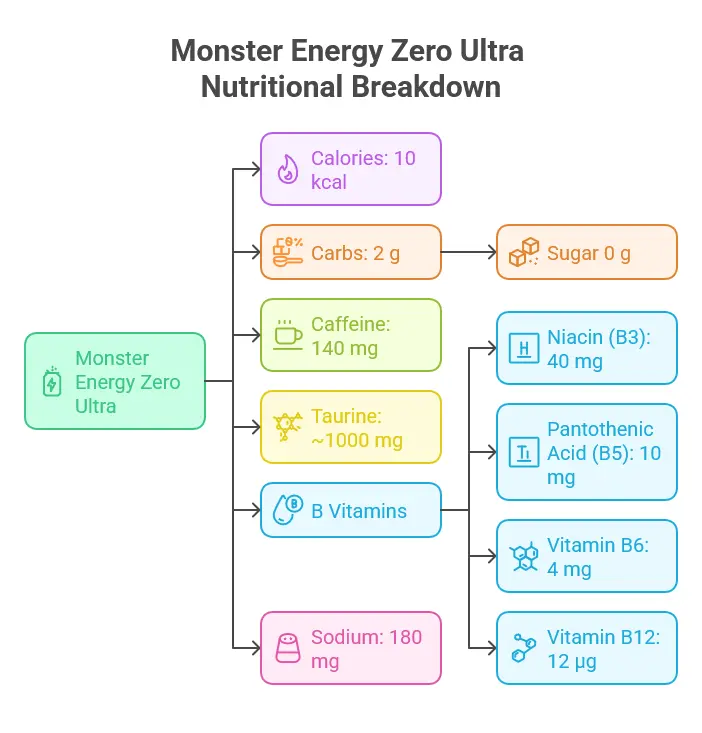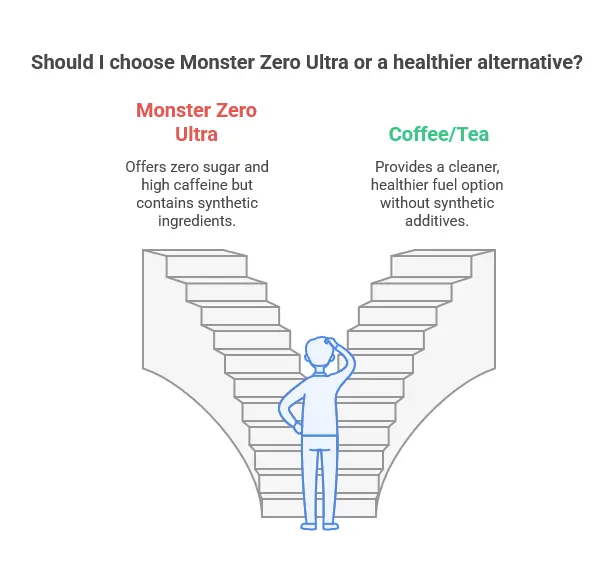Monster Energy Zero Ultra promises a lighter, sugar-free kick with “full Monster energy blend” vibes—but does it live up to the hype, or is it just another flashy can? Let’s break down the nutrition, sift through the ingredients, expose the marketing spin, and decide if it’s worth stocking in a “healthy” vending machine—or if better options exist.
Nutritional Breakdown:
Low Cal, High Buzz, B-Vitamin Overload
A 16 oz (473 ml) can of Monster Zero Ultra delivers:
- Calories: 10 kcal (negligible, from trace carbs or additives)
- Sugar: 0 g (replaced with sweeteners)
- Carbs: 2 g (from erythritol, a sugar alcohol—more on that later)
- Caffeine: 140 mg (about 1.5 cups of coffee)
- Taurine: ~1000 mg (typical energy-drink dose, not precise on label)
- B Vitamins:
- Niacin (B3): 40 mg (250% DV)
- Pantothenic Acid (B5): 10 mg (200% DV)
- Vitamin B6: 4 mg (235% DV)
- Vitamin B12: 12 µg (500% DV)
- Sodium: 180 mg (8% DV)

The B vitamins are jacked up—500% DV for B12? That’s a neon sign screaming “energy!” They do aid metabolism, converting food to fuel, but here’s the rub: they’re water-soluble. Excess gets flushed out, not stored. A Nutrients review (2019) caps B6 toxicity at 200 mg (we’re at 4 mg) and B12 at absurdly high levels (way beyond 12 µg), so no harm, but also no real edge unless you’re deficient.
The 140 mg caffeine is the real driver—studies like Journal of Psychopharmacology (2010) confirm it boosts alertness. Sodium’s moderate, not a red flag. Zero sugar’s a win, but those 2 g carbs? Erythritol—doesn’t spike blood sugar, mostly passes through. Still, the B-vitamin blast feels like a hype prop—big numbers, little payoff.
Ingredients: Synthetic Soup with a Citrus Twist
Monster Zero Ultra’s lineup (U.S. version):
- Carbonated Water: Natural, just fizzy H2O.
- Citric Acid: Likely synthetic, made industrially from mold fermentation. Safe, tangy.
- Erythritol: A sugar alcohol, fermented from glucose. “Natural” origin, but processed—zero-calorie, keto-friendly.
- Taurine: Synthetic, lab-made amino acid. GRAS by FDA, but benefits (Frontiers in Physiology, 2018) are shaky at this dose.
- Sodium Citrate: Synthetic buffer, derived from citric acid.
- Natural & Artificial Flavors: Vague—some plant extracts, some lab creations. Citrus vibe, but not straight from oranges.
- Caffeine: Could be natural (coffee/tea) or synthetic. Monster doesn’t say—works either way.
- Sucralose & Acesulfame Potassium: Artificial sweeteners, zero calories, lab-born. Safe per FDA, but not “natural.”
- Sorbic Acid, Benzoic Acid: Synthetic preservatives, keep it shelf-stable.
- Niacinamide (B3), D-Calcium Pantothenate (B5), Pyridoxine HCl (B6), Cyanocobalamin (B12): All synthetic, lab-crafted vitamins.
- Panax Ginseng Flavor, L-Carnitine L-Tartrate, Inositol: Trace “energy blend” extras—synthetic, minimal impact at these levels.
This is a lab-crafted cocktail—taurine, sweeteners, preservatives, and vitamins all scream “factory,” not “field.” Erythritol and “natural flavors” nod to nature, but processing strips the purity. Safe? Yes. Natural? Hardly.
Calling Out the Hype
Monster pushes Zero Ultra as “lighter-tasting, zero sugar, full energy”—half-true. The caffeine (140 mg) delivers, no doubt—solid for a workout or late shift. But the “Monster Energy Blend” (taurine, L-carnitine, ginseng, inositol)? Thin on proof. Taurine’s hyped for performance, yet studies lack punch at these doses. B vitamins? A nutritional fireworks display—500% B12 sounds epic, but it’s overkill for most. The zero-sugar swap (sucralose, ace-K) dodges Red Bull’s 27 g bomb, but artificial sweeteners carry their own baggage—some folks report gut issues or dislike the aftertaste, though science (e.g., EFSA, 2011) deems them safe. It’s less crash-prone than sugary drinks, but Mayo Clinic Proceedings (2017) still flags energy drinks for heart-rate spikes. Hype says “unleash the beast”; reality says “caffeine with extras.”
Smarter Choices
Ditch the flash—try these: Black coffee (zero sugar, natural caffeine), green tea (antioxidants, smoother lift), or plain water with electrolytes (no synthetics, pure hydration). If you’re hooked on energy drinks, Red Bull Sugarfree (80 mg caffeine, similar sweeteners) is lighter. A banana and water? Natural B6, carbs, no lab vibes. Zero Ultra’s not the devil, but it’s not a health elixir either.
Vending Machine Verdict: Pass, But Barely
For a “healthy” vending machine, Monster Zero Ultra teeters. Zero sugar beats Red Bull Original, and 140 mg caffeine packs a punch without overload (EFSA caps daily safe intake at 400 mg). But the synthetic stew—sweeteners, taurine, B-vitamin excess—clashes with “healthy” vibes. We stock it, because people are addicted, but label it “performance, not wellness.” Coffee or tea wins for cleaner fuel. Readers, unless you want to unleash a real beast, skip the hype, pick smarter.


